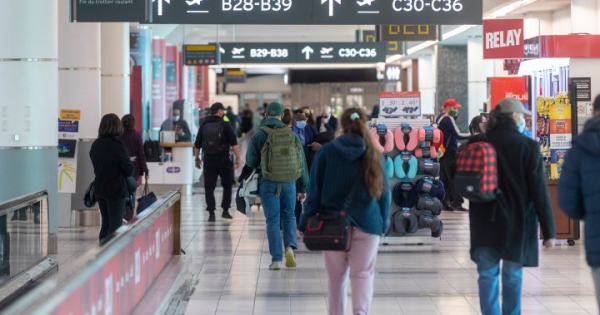"In a significant revelation, a recent Leger poll indicates that a substantial majority of Canadians share the belief that higher immigration is exacerbating the housing crisis and straining the health-care system. The survey, conducted over the weekend, also unveils the Conservatives maintaining a considerable lead over the governing Liberals in federal voting intentions.
A staggering three-quarters of respondents expressed agreement that the surge in immigrants is intensifying pressures on both the housing market and the health-care system. Furthermore, 63 per cent of participants asserted that the influx of newcomers is adding stress to the country's education systems.
Despite these concerns, the poll illuminates a nuanced perspective among Canadians, highlighting some perceived benefits of increased immigration. Approximately three-quarters of respondents acknowledge that higher immigration contributes to the cultural diversity of the nation. Moreover, 63 per cent believe that the arrival of young immigrants enhances the workforce and tax base, providing support for older generations.
Leger conducted the poll online with 1,529 participants, and while results were statistically weighted, a margin of error cannot be assigned due to the non-random nature of online polls. The findings underscore the ambivalence Canadians harbor regarding the impact of immigration on the country. This sentiment shift coincides with ongoing challenges related to affordability and public service delivery.
The year 2022 witnessed Canada's population expanding by over a million people, including 607,782 non-permanent residents and 437,180 immigrants. Notably, compared to March 2022, fewer Canadians now express a desire for the country to welcome more immigrants, with the percentage dropping from 17 per cent to nine per cent. Conversely, there is an uptick in those advocating for fewer immigrants, rising from 39 per cent to 48 per cent.
Christian Bourque, executive vice-president of Leger, suggests a growing association in the minds of Canadians between immigration and issues like housing affordability. He notes a shift in the country's makeup and challenges, emphasizing that the post-pandemic landscape has altered perspectives. The federal government faces scrutiny for rapidly escalating annual immigration targets amid a surge in the number of temporary residents in the country."
"In a strategic move, Canada is set to increase the intake of permanent residents in 2024 and 2025 to 485,000 and 500,000, respectively, according to the original plan. However, findings from the Leger poll indicate a noteworthy divide in public opinion, with 53 per cent of respondents considering these numbers too high, while 28 per cent believe Canada is on track in admitting the right number of immigrants. Only four per cent opined that the country falls short in welcoming enough immigrants.
The federal Liberals have consistently argued that expanding the country's population is essential to address labor shortages and cope with an aging demographic. They contend that newcomers can contribute significantly to building homes, addressing the pressing housing needs of Canadians. Despite these assertions, ongoing debates regarding Canada's capacity to manage increased immigration flows prompted Immigration Minister Marc Miller to present new targets in Parliament, proposing a stabilization of new permanent resident numbers at 500,000 in 2026.
Meanwhile, the latest Leger poll on federal voting intentions reveals the Conservatives maintaining a formidable 14-point lead over the Liberals. Forty per cent of respondents express a preference for the Conservatives in the event of an election, while 26 per cent lean towards the Liberals, and 20 per cent favor the NDP. Notably, only 29 per cent of respondents express satisfaction, to varying degrees, with Prime Minister Justin Trudeau's government, a trend showing decline in recent months.
The survey also delves into perceptions of leadership, indicating a shift in focus in federal politics. Conservative Leader Pierre Poilievre, though experiencing a four-percentage-point drop since October, still commands the lead as the choice for the best prime minister, with 25 per cent support. Trudeau trails at 19 per cent, while NDP Leader Jagmeet Singh garners 17 per cent support. Christian Bourque, executive vice-president of Leger, notes that the leaders' lower support compared to their parties suggests an emerging emphasis on leadership as a central theme in future political discourse. He poses the question: will leadership become the defining factor in the political landscape ahead?"
"In conclusion, the evolving dynamics of Canadian public opinion on immigration, as highlighted by the Leger poll, reflect a nuanced perspective. While the government's push for higher immigration targets aligns with the aim of addressing labor shortages and demographic challenges, a significant portion of the population remains skeptical, with 53 per cent considering the planned numbers too high.
The political landscape, as revealed by the poll, underscores a substantial lead for the Conservatives, raising questions about the trajectory of federal politics. Notably, the decline in satisfaction with Prime Minister Justin Trudeau's government and the shift in preferences for potential prime ministers signal a potential shift in focus towards leadership as a pivotal aspect in shaping the political narrative.
As Canada grapples with these complex issues, including housing concerns, the role of immigration, and shifting political preferences, it remains to be seen how these dynamics will unfold in the coming months. The intricate interplay between public sentiment, policy decisions, and leadership dynamics will likely shape the ongoing discourse on these crucial matters."






